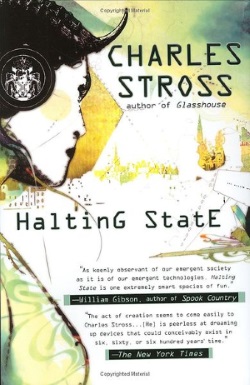
Embarrassingly for someone who claims to be fan of science-fiction, it’s been a while since I last read a sci-fi novel. Most of my fiction reading these days are on the web, either web-based originals or fanfiction. I picked Charles Stross’s Halting State to read recently both because I’d previously read his Accelerando and thought it interesting and because this particular novel’s tie-in with online gaming worlds seems like a good fit for my own interests.
A quick look at the promotional blurbs on the back cover is illuminating. At the top is praise from sci-fi luminary Vernor Vinge, but below it are quotes from John Carmack of Id Software and Ralph Koster of Ultima Online. This isn’t very surprising given the subject matter of the novel. Set in Scotland in the year 2018, it opens with a police sergeant being called in to handle an unusual robbery: a marauding band of orcs, with a dragon along for fire support, has just robbed the bank of a popular online game.
Yet it’s a crime with real consequences and not just because the virtual goods are worth real money. The bank is just one of several whose management has been outsourced to a specialist firm Hayek Associates both for security purposes and to allow for expert management of the in-game economy. Is it merely a coincidence that Hayek has just floated on the London stock exchange and this incident, once made public, would cause its share price to massively tank? Then there’s the chance that not only are the economies of all of the online games at risk but that the seemingly impossible heist is evidence of a fundamental security failure that undermines all online communications and transactions.
The whole thing is unusually told in the second-person perspective, with the “you” being sequentially each of the three protagonists: Sue, the police sergeant; Elaine, the forensic accountant; and Jack, the game programmer. It’s a stylistic quirk that puts some distance between the reader and the characters, but also seems strangely appropriate for the hyperreal world of the novel. Parts of the novel naturally take place within online game-worlds but even in the real-world scenes, augmented reality technology and always-on access to the net allows the virtual to freely intermix with the real.
Since this novel was published in 2007, none of the technology displayed here is particularly new even if they’re not quite mainstream yet. Stross is on record for commenting that the novel wasn’t meant to be predictive but so far everything in it except for Scottish independence and the use of quantum computers to crack crytographic codes have come true. Some of the cooler stuff include augmented reality overlays for the police, crowd-sourced alternate reality games that take place in the real-world, the ability for players to freely convert and transfer their characters between different online games that share a common framework and so forth. One amusing decision here is the assumption that true self-driving cars are unfeasible but it is common to give up local control to teleoperators.
Some of my favorite bits are at the beginning, with the detailed descriptions of modern business management practices and contractual relationships between companies. I really liked how Elaine and Jack are brought into the investigation, as part of a consultancy that has an interest in ensuring that the heist wasn’t an inside job to minimize their own liability. I also enjoyed how the scope of the investigation widens over time, eventually causing the men-in-black to jump in. It’s pretty funny to even think that the seemingly inoffensive EU has such operatives.
Still, somewhere around two-thirds of the way through, the novel loses its way as far as I’m concerned. Not only is the romantic entanglement clichéd as hell, it’s not remotely plausible and doesn’t add anything to the story. I’m not even sure what the value of having both Elaine and Jack as POV characters is since they’re almost always together throughout the whole novel. I am also sorely disappointed that the novel keeps building up to some terrible and huge secrets, both on an international and on a personal level, but the payoff doesn’t justify the hype at all. It’s all smoke and no fire. Having the state actors being supremely incompetent may be funny and perhaps fits well with Stross’ politics, but it sure doesn’t make for a very exciting thriller.
Overall, it’s a light and enjoyable read especially if you’re an online gamer but it’s ultimately rather unsubstantial and forgettable.